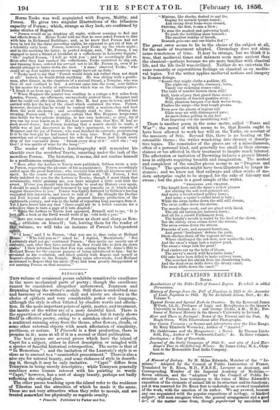PIN o c car.* Tams -volume of occasional poems exhibits
considerable excellence in the more mechanical parts of poetry; though the excellence cannot be considered altogether unborrowed, Tennyson and Browning being the writer's models. Still there is undoubted ease and harmony of versification ; skill and nicety are shown in the choice of epithets and very considerable power over language, although the style is often vitiated by obsolete words and affecta- tion. In the more important points of spirit, matter, and treatment, the merits of the writer are of a more doubtful kind. There is the apparition of what is called poetical power, but it rarely shows itself in effective poetry, owing to a mistaken choice of subjects, a continual running away from the theme, after flowers, clouds, or some other external objects with much affectation of simplicity, prettiness, or nature. If Pinocchi is a first production, there is promise in it; none at all if it is a second or third publication.
The best poems are several pieces which have the island of Capri for a subject, either in direct description or mingled with a species of fanciful historical retrospection. The metre is that of "In Memoriam" ; and the imitation of the Laureate's style is so close as to amount to a " counterfeit presentment." There is also a nice eye for natural beauty, and some richness of style in describ- ing it, though it may be only imitative. " Capri" differs from Tennyson in being merely descriptive ; while Tennyson generally combines some human interest with his painting in words. " Capri," however, has a sort of sleepy beauty, perhaps not badly reflecting the original place.
The other poems touching upon the island refer to the residence of Tiberius and the atrocities of which he made it the some. These are not very attractive when they refer to morals, and are treated somewhat too physically as regards cruelty.
• Pinocchi. Published by Parker and Son. "Minions, like sharks, dashed to and fro, Gaping for morsels tyrant-tossed ; And racing rival foam-ways crossed, Striving, the first, to aim a blow; To stun the mashed and quivering head ; To push the bubbling mass beneath ; The smallest residue of breath, Beneath pole-axe and oar-blades fled !"
The great error seems to lie in the choice of the subject at all, for the mode of treatment adopted. Chronology does not alone
cause remoteness of time. It.may be strange, but we think it is true, that mediaeval times and manners seem more ancient than
the classical—perhaps because we are more familiar with classical life, and the life itself was civilized. Neither do we entertain the same romantic or superstitious feelings on classical as on mediae- val topics. Yet the writer applies mediaeval notions and imagery to Roman doings.
"Scents that might clothe a goddess, fill
The night-air ; myrtle, rosemary, balm, Vainly our sickening senses calm The taint of murder haunts them still !
Still, birds of prey that guard these stones With shrieks of fancied quarries stoop ; Still, phantom barques o'er dark waves troop, Flashes the surge—the bent bough groans.
Even now the ghosts of legions tall Glide near me with distempered pace ; As snow-flakes pelting in my face Pass lingering o'er the mouldering wall."
There is another poem in the same metre, called "Peace and War" ; the moral of which seems to be, that Russia ought to have been allowed to work her will on the Turks, on account of the massacre of Scio. Beyond this, there is no bearing on the ostensible theme ; the writer wandering into dreamy or descrip- tive topics. The remainder of the pieces are of a miscellaneous, often of a personal kind, and generally too small in their circum- stances or too affected in their treatment to inspire much interest. The affectation or imitation of Browning induces a prosaic literal- ness in subjects requiring breadth and imagination. The neatest and completest of the smaller pieces seems to us " Progress and Change." The question might havebeen illustrated by larger in- stances ; and we know not that railways and other works of mo- dern enterprise ought to be stopped for the sake of falconry and swans ; but the piece is a good sample of the writer.
"PROGRESS AND CHANGE.
"The hisped hem and the dame's yellow plumes Are stirring the soft reed-prisoned air, And many a broad-reined palfrey fumes, And many a squire's curled head is bare ; While the swan ruffles down the still still stream, The swan ruffles down the stream.
The marsh-flags creak, and are glued with blood, The old old turrets are battered down ; And all for a cursed Parliament feud, The knight's mouth is sealed by the heel of the clown. But the stately swan swims down the stream, The swan swims down the stream.
Peacocks of yew, and squared hornbeam, And green lusthuises' deform the park, Show-ditches drain off the vagrant stream; Where challenged the red-deer, now nestles the lark, And the swan's wings lash a narrow pond, The swan's wings lash the pond !
Foul cinders eat up the belts of bloom, The navvy's smock wild hyacinths stain,' Old oaks have been felled to make railway room, The scorched firs shrink from the thundering train, And the dead swan drifts down the dreary canal, The swan drifts down the canal !"


























 Previous page
Previous page